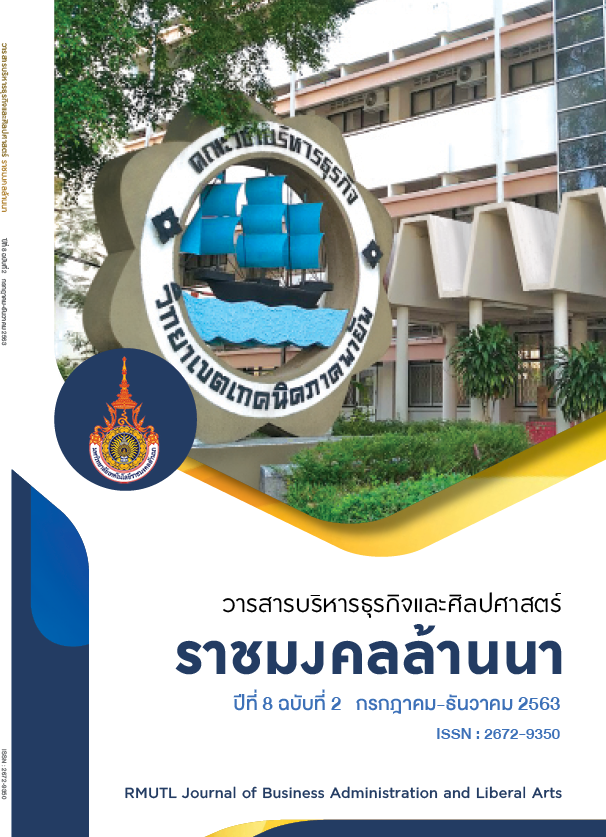อิทธิพลของปัจจัยที่ส่งผลต่อการสื่อสารภาษาอังกฤษโดยมีแรงจูงใจเป็นตัวแปรคั่นกลางและความวิตกกังวลเป็นตัวแปรกำกับ
Main Article Content
บทคัดย่อ
การวิจัยครั้งนี้มีวัตถุประสงค์ของการวิจัย 1.เพื่อศึกษาอิทธิพลของปัจจัยด้านการฝึกฝนภาษาอังกฤษ ปัจจัยด้านความรู้พื้นฐานภาษาอังกฤษ ปัจจัยด้านกลวิธีในการเรียนภาษาอังกฤษ ปัจจัยด้านทัศนคติส่วนบุคคลที่มีต่อภาษาอังกฤษ ที่ส่งผลต่อการสื่อสารภาษาอังกฤษของนิสิตระดับปริญญาตรีในจังหวัดชลบุรี 2.เพื่อศึกษาว่าแรงจูงใจเป็นตัวแปรคั่นกลางระหว่างปัจจัยด้านกลวิธีในการเรียนภาษาอังกฤษกับการสื่อสารภาษาอังกฤษ 3.เพื่อศึกษาว่าความวิตกกังวลเป็นตัวแปรกำกับระหว่างแรงจูงใจกับการสื่อสารภาษาอังกฤษ กลุ่มตัวอย่างที่ใช้ในการวิจัยครั้งนี้ ได้แก่ นิสิตที่กำลังศึกษาอยู่ระดับปริญญาตรีในจังหวัดชลบุรี จำนวน 385 คน
จากผลการวิจัยและการทดสอบสมมติฐานพบว่าปัจจัยทางด้านการฝึกฝนภาษาอังกฤษ ปัจจัยด้านความรู้พื้นฐานภาษาอังกฤษ ปัจจัยด้านกลวิธีในการเรียนภาษาอังกฤษและปัจจัยด้านทัศนคติส่วนบุคคลที่มีต่อภาษาอังกฤษส่งผลต่อการสื่อสารภาษาอังกฤษ นอกจากนั้นจากการวิเคราะห์ความสัมพันธ์ค่าอิทธิพลรวม พบว่าแรงจูงใจเป็นตัวแปรคั่นกลางทำหน้าที่ส่งอิทธิพลแบบบางส่วนระหว่างความสัมพันธ์ของเทคนิคการเรียนภาษาอังกฤษกับการสื่อสารภาษาอังกฤษ และจากการทดสอบความสัมพันธ์ระหว่างแรงจูงใจกับการสื่อสารภาษาอังกฤษนั้นพบว่าแรงจูงใจมีความสัมพันธ์กับการสื่อสารภาษาอังกฤษ และตัวแปรปฏิสัมพันธ์ ดังนั้นสรุปได้ว่า ความวิตกกังวลเป็นตัวแปรกำกับที่มีความสัมพันธ์กึ่งหนึ่งหรือบางส่วน ( Quasi Moderator )
Article Details
บทความวิจัยนี้เป็นของลิขสิทธิ์
เอกสารอ้างอิง
กระทรวงศึกษาธิการ. (2546). พระราชบัญญัติการศึกษาแห่งชาติ พ.ศ. 2542 และที่แก้ไขเพิ่มเติม (ฉบับที่ 2) พ.ศ. 2545. กรุงเทพมหานคร: คุรุสภา.
กาญจนา ปราบพาล และประกายแก้ว โอภานนท์อมตะ. (2545). การสำรวจความสามารถทักษะภาษาอังกฤษของบัณฑิตไทย. กรุงเทพมหานคร: ศูนย์ทดสอบทางวิชาการแห่งจุฬาลงกรณ์มหาวิทยาลัย.
ขวัญฤทัย เชิดชู. (2550). การศึกษากลวิธีการสื่อสารภาษาอังกฤษของนักศึกษาชั้นปีที่ 1 โปรแกรมภาษาอังกฤษ สถาบันเพชรบุรี.จังหวัดเพชรบุรี(วิทยานิพนธ์ปริญญาศึกษาศาสตร์มหาบัณฑิต). กรุงเทพมหานคร: มหาวิทยาลัยศิลปากร.
เจนจิรา ชัยปาน, ทรายขวัญ พรมแก้ว และสิทธิ ศรีนาค. (2556). ปัจจัยที่ส่งผลต่อความวิตกกังวลในการพูดภาษาอังกฤษของนักศึกษาหลักสูตรสาขาวิชา ภาษาอังกฤษเพื่อการสื่อสารสากลสาขาภาษาต่างประเทศ ชั้นปีที่ 4(ภาคนิพนธ์ปริญญาศิลปะศาสตร์บัณฑิต). สงขลา: มหาวิทยาลัย เทคโนโลยีราชมงคลศรีวิชัย.
ณัฏฐ์นรี ฤทธิรัตน์. (2557). ความสามารถด้านการพูดภาษาอังกฤษและปัญหาในการพัฒนาทักษะการพูดภาษาอังกฤษของนักศึกษามหาวิทยาลัย(วิทยานิพนธ์ศึกษาศาสตรมหาบัณฑิต). สงขลา: มหาวิทยาลัยสงขลานครินทร์.
นงสมร พงษ์พานิช. (2554). การศึกษาปัญหาของการพูดภาษาอังกฤษในการสื่อสารด้วยวาจาของนิสิต คณะวิทยาการจัดการ. วารสารมนุษยศาสตร์, 18(1), 85–97.
ปาริชาต บุญมี. (2560). โมเดลความสัมพันธ์เชิงสาเหตุระหว่างเพศ ระดับชั้น กับแรงจูงใจในการเรียนภาษาอังกฤษ ของนักเรียนในเขตพื้นที่การศึกษาภาคตะวันออก. ชลบุรี: มหาวิทยาลัยบูรพา.
ยุพเยาว์ เมืองหมุด และคณะ. (2548). ปัจจัยที่มีผลต่อความสามารถในการพูดภาษาอังกฤษของนักศึกษาแรกเข้าระดับปริญญาตรีหลักสูตร 2 ปีต่อเนื่องมหาวิทยาลัยเทคโนโลยีราชมงคลสุวรรณภูมิ วิทยาเขตพระนครศรีอยุธยาวาสุกรี. พระนครศรีอยุธยา: มหาวิทยาลัยเทคโนโลยีราชมงคลสุวรรณภูมิ วิทยาเขตพระนครศรีอยุธยา.
วรางคณา เค้าอ้น. (2560). การพัฒนาทักษะการสื่อสารภาษาอังกฤษ โดยใช้สถานการณ์เป็นฐานการเรียนรู้(วิทยานิพนธ์ศึกษาศาสตรมหาบัณฑิต). กรุงเทพมหานคร: มหาวิทยาลัยธุรกิจบัณฑิตย์.
สมภพ เรืองตระกูล. (2542). ตำราจิตเวชศาสตร์. (พิมพ์ครั้งที่ 6). กรุงเทพมหานคร: โรงพิมพ์เรือนแก้ว.
อริสรา ลอยเมฆ. (2539). การศึกษาความวิตกกังวลของนักกรีฑาประเภทลู่กลุ่มประเทศอาเซียนที่เข้าร่วมการแข่งขันกีฬาซีเกมส์ ครั้งที่ 18 ที่จังหวัดเชียงใหม่ ประเทศไทย(วิทยานิพนธ์คุรุศาสตรมหาบัณฑิต). กรุงเทพมหานคร: จุฬาลงกรณ์มหาวิทยาลัย.
อุรปรีย์ เกิดในมงคล. (2557). การศึกษาและพัฒนารูปแบบการให้คำปรึกษากลุ่มเพื่อเสริมสร้างความหวังทางการศึกษาของนักเรียนวัยรุ่น(วิทยานิพนธ์ดุษฎีบัณฑิต). กรุงเทพมหานคร: มหาวิทยาลัยศรีนครินทรวิโรฒ.
เฮลส์, ไดแอนน์ และเฮลส์, โรเบิร์ต อี. (2546). โรควิตกกังวล. (แสงอุษา สุทธิธนกูล, ผู้แปล). กรุงเทพมหานคร: หมอชาวบ้าน.
Cochran, W. G. (1977). Sampling techniques. New York: John Wiley & Sons.
Deci, E. L., & Ryan, R. M. (2000). The 'what' and 'why' of goal pursuits: Human needs and the self-determination of behaviour. Psychological Inquiry, 11(4), 227-268.
Dornyei, Z. (2013). Motivational strategies in the language classroom. Cambridge: Cambridge University Press.
Gardner, R. C. (1985). Social psychology and second language learning: The role of attitudes and motivation. London: Arnold.
Hua, H. X. (1985). Chinese EFL students’ learning strategies for communication. TESOL Quarterly, 19(1), 167-168.
Lee, K. R., & Oxford, R. (2008). Understanding EFL learners’ strategy use and strategy awareness. Asian EFL Journal, 10(1), 7-32.
Oxford, R. (1990). Language learning strategies: What every teacher should know. Rowley, MA: Newbury House.
Padwick, A. (2010). Attitudes towards English and varieties of English in globalizing India. England: University of Groningen.
Reimann, A. (2001). Motivation for acquiring English as a second language: An investigation of Chinese and German native speakers. Japan: Faculty of Foreign Studies, Tokoha Gakuen University.

